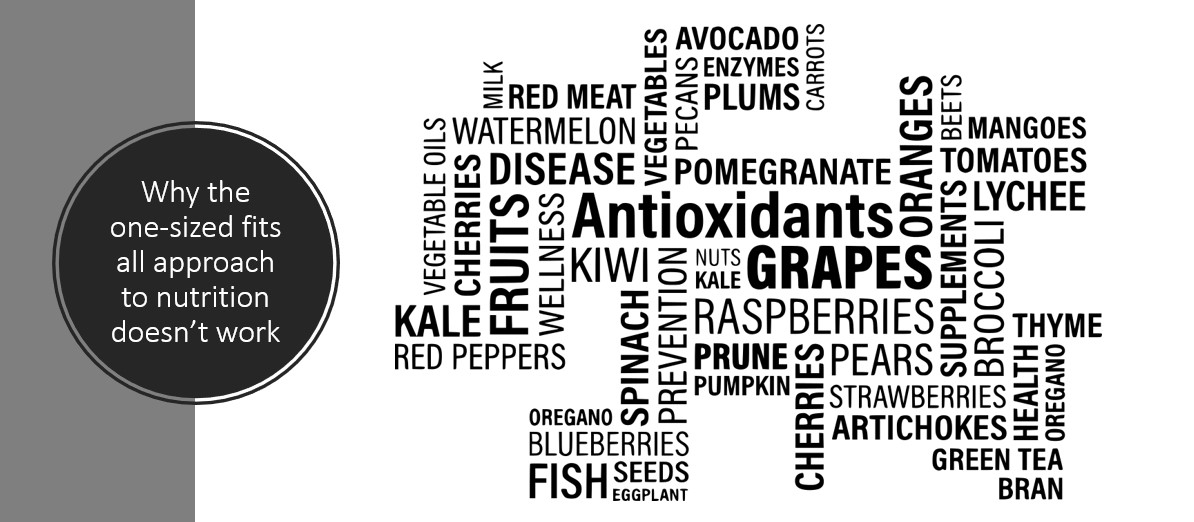Why the one-sized fits all approach to nutrition doesn’t work
Eight glasses of water a day.
Six servings of vegetables.
Make sure you get the recommended daily intake of calcium.
We tend to like to think general nutrition prescriptions have value. Why else would our governments put out food guides for us to follow (of which most people pay no attention to anyway, other than to serve as a source of guilt because they realize they’re not following the guide very well)?
It doesn’t make a whole lot of sense, though, does it? It’s pretty obvious that various foods — for example, bread and dairy—affect us all differently: Some of us pack on pounds and get congested if we touch a piece of pizza, while others can eat a block of cheese on an entire loaf of bread and carry on as if nothing happened.
Despite our obvious differences, both in body compositions and in the way our bodies handle different diets, there are a ton of people out there who are adamant they know the best diet—for everyone!
On the soap box, they yell:
I lost 50 lb. on the Ketogenic diet! Everyone should try Keto!
Plant-based changed my life. Meat is evil and will give you cancer. Switch to plant-based!
What about we get off our soap boxes for a bit and do some self-experimenting to see what’s right for our own unique selves?
This is exactly what they did in the recent Personalized Nutrition Project for Prediabetes study. This cohort study observed glucose levels in 800 people in response to 46,800 meals consumed.
The results: Identical meals led to different blood sugar levels in different people.
“This study suggests that general dietary recommendations may have inadequate usefulness,” said the study’s authors, who suggest these differences might be linked at least partially to microbiota composition and function (basically meaning our gut health).
Thus, as much as we like to think of nutrition as a science that can give us black and white answers, it’s also most certainly a bit of an art, and might take some trial and error-ing to figure out what’s best for you.
In light of this, here are five diet-related principles—ones where the verdict is clearly still out (i.e. there is no generally agreed-upon consensus)—you can experiment with to see what might work for you:
1. Is breakfast really the most important meal of the day?
There’s a lot of debate about whether breakfast within an hour of waking up is really necessary. Some think it was just a clever marketing ploy started by the cereal companies to get you pounding your shreddies or Special K in the a.m.
Only one way to find out: Try a month where you have your first meal at noon. See how you feel and what happens to your body. Check out more here if you’re interested in digging deeper into the breakfast debate.
2. Intermittent fasting
Another contentious issue, some people swear intermittent fasting helps them not only lose weight, but also feel better and more energetic. For an always balanced Precision Nutrition approach, check this out for more about intermittent fasting.
3. 30-day Elimination
Are you sensitive or gluten? To dairy? Eggs? Try eliminating different foods from your diet for a month as an experiment. Go back to the food after a month and see what happens. Read more here.
4. More meals a day? Less, smaller meals?
It’s the three larger meals versus six small meals debate! Try both and decide for yourself. And check this out for more.
5. Post-meal carbohydrates?
Do you really need carbohydrates within 30 minutes of working out? Some say you do, some say you don’t.
Here’s the thing: Your best guide is what your body is telling you. If you’re super hungry the moment you wake up, maybe you do need breakfast first thing. If you get a stomach ache from eating cheese, maybe stop eating it. The point is you are a unique individual, not a template who should follow a good guide your government made for you. Don’t be afraid to take matters into your own hands to figure yourself and your body out. Or hire a coach who can steer you in the right direction.







